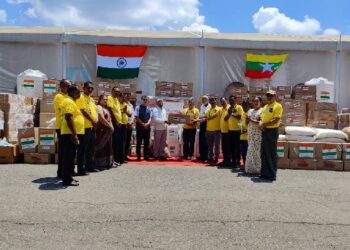European Union leaders agreed late on Wednesday on new sanctions targeting Iran for the direct attack on Israel.
The EU has decided “to put in place sanctions against Iran”, European Council President Charles Michel told reporters in the early hours of Thursday morning after the first day of a two-day summit.
“The idea is to target the companies that are needed for the drones, for the missiles,” he said. Further details are to be finalized, he added.
“The European Union will take further restrictive measures against Iran, notably in relation to unmanned aerial vehicles (UAVs) and missiles,” the EU leaders’ statement said.
The economy and competitiveness of the EU was to be the main topics of discussion at the summit that will take place on Wednesday and Thursday. However, the economic conversation was moved to the second day’s agenda due to growing tensions in the Middle East.
As Israel considered how to respond to Iran’s drone and missile attack on Saturday, EU officials urged Israel to maintain composure.
Upon his arrival, German Chancellor Olaf Scholz pleaded with Israel not to launch a “massive attack of its own” in retaliation against Iran.
Scholz urged Israel to “enhance its own position in the entire region” by building on its successful defense against Iran’s missile and drone attack. “A corresponding military response would certainly not be appropriate,” he stated in light of this.
Iran asserted that the missile and drone strikes were retaliation for the killing of high-ranking Iranian officers in a missile strike on Iran’s embassy in Syria at the start of the month.
A system put in place after Iran started arming Moscow with drones to support Russia’s invasion of Ukraine may be used to enforce sanctions.
These sanctions, which forbade the shipment of parts to Iran for the manufacture and development of unmanned aerial vehicles, may be extended to make it more difficult for Iran to produce missiles.
It is more difficult to comply with calls by Israel to label the elite unit of the Iranian armed forces, the Islamic Revolutionary Guard Corps (IRGC), as a terrorist group.
This sanction would not take effect unless the IRGC was charged under EU legislation for terrorist actions by a state authority. Scholz stated, however, that a recent EU court decision on the IRGC’s operations is being looked into by EU officials.
This might lead to the IRGC being designated as a terrorist organization, according to Scholz. Alexander De Croo, the prime minister of Belgium, declared that his nation will back the IRGC’s sanctions.
Along with the Middle East, Volodymyr Zelensky, the president of Ukraine, participated in the meeting via video conference and spoke with EU leaders about the necessity of air defense weapons for his nation.
Zelensky demanded more assistance from the EU in his speech to leaders regarding Russian airstrikes.
He made a contrast between Ukraine’s assistance—or lack thereof—against Russian bombing and the support Israel received when US, French, and British jets assisted in shooting down Iranian drones and missiles.
“Here in Ukraine, in our part of Europe, unfortunately, we do not have the level of defence that we all saw in the Middle East a few days ago,” he said. “Our Ukrainian sky and the sky of our neighbours deserve the same security,” he added.
The EU leaders’ statement “underlines the need to urgently provide air defence to Ukraine and to speed up and intensify the delivery of all the necessary military assistance, including artillery ammunition and missiles”.
According to Scholz, Germany has already sent Ukraine two Patriot surface-to-air missile systems and plans to provide another.
According to Dutch Prime Minister Mark Rutte, Denmark and the Netherlands are collaborating to supply F16 fighter jets.
“We know that we have to do more than we have been doing so far to support Ukraine now. This applies in particular to all the air defence capabilities that are required,” Scholz said.







 Finance
Finance







